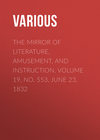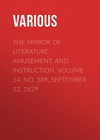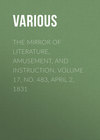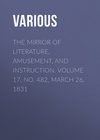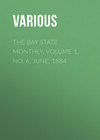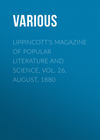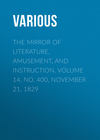Czytaj książkę: «The Mirror of Literature, Amusement, and Instruction. Volume 19, No. 553, June 23, 1832», strona 5
The Willows of Babylon.
"In reference to the willow and the streams of Babylon, where the Hebrews remembered Zion so mournfully, Sir Robert Ker Porter states, that 'the banks of the Euphrates were hoary with reeds, and the grey osier willows were yet there on which the captives of Israel hung their harps,' and wept in the land of the stranger. The salix babylonica, or the weeping willow, in its geographical range, sweeps through the plains of Judea, and by the ruins of Babylon, from the verge of the Mediterranean to the frontiers of Japan—a lovely line of beauty—the Niobe of vegetation! Sad memorial of the mournful march of the captive Hebrews. It is, we think, a very striking circumstance, that these countries should even now retain such unchanged lineaments of their ancient history. Time seems to linger, or move slowly on; as if the wheels of nature stood still, and paused at the mournful sight of departed grandeur and buried magnificence—BABYLON in ruins! 'MENE!—GOD hath numbered thy kingdom, and finished it!' Mr. Rich has given us a sketch of a spade copied from a Babylonian brick found near El Kasr, and detached from a mass of ruin, in all probability, on the very site of Nebuchadnezzar's pensile gardens; and he remarks, that it is almost a fac simile of the spade used at this very day in Chaldea."
SPIRIT OF DISCOVERY
Heating with Hot Water
Mr. A.M. Perkins has communicated to the Gardeners' Magazine the details of his plan for heating hot-houses by the circulation of hot water in hermetically sealed tubes of small diameter. Upon the economy of the plan, Mr. Loudon observes:—"With respect to the power of the one-inch tubes, it has been demonstrated by a mathematician and chemist of the very first authority, that as much will be effected by one of Mr. Perkins's one-inch tubes, heated to 300° as by one of the three-inch tubes, employed in any of the ordinary modes of heating by hot water when heated to 180°." A second advantage of Mr. Perkins's mode for hot-houses, is the small space which the pipes occupy. A third advantage is, that the water may be circulated without regard to whether the tubes are below or above the level of the fire-place. "But, however favourable this plan may be for heating hot-houses, the advantage for that class of structures are as nothing compared to those which it offers for heating dwelling-houses and all kinds of manufactories. This will be understood at once, when it is stated that the water may be circulated under ordinary circumstances of attention to the fire, at from 300° to 600°; and, with extraordinary strength of pipe, and application of fuel to a still higher degree. It is found that 400° will roast meat. The workmen in the bank-note printing-office of Messrs. Perkins and Bacon have dressed a beefsteak at the further extremity of the pipe of hot water used for heating the steel plates; and Mr. Perkins is constructing for himself an oven for roasting by water. It is easy to see, that, in a very short time, this will lead to extraordinary and most beneficial changes in domestic arrangements; and that if we could get rid of our prejudices in favour of open fires, the smoky atmospheres of our great towns would be got rid of at the same time. Water at 500°, or, at least, water at 300°, for the purposes of cookery, and for heating reserve cisterns of cold water, or masses of metal or masonry, for various domestic purposes, including warming rooms, heating baths, laundries, &c. may, at no distant time, be circulated by companies, in the same manner as gas; and, in London, instead of one fire for every room, as at present, there may be only one in a parish, or in every square of an acre in area."
A Marine Railway
for the purpose of conveying vessels overland, has been projected by Mr. Henry Fairbairn, in the United Service Journal for May, 1832. The vessels are to be raised from the sea by machinery, placed in slips and dragged along the railway by locomotive steam-engines. The same author proposes to connect Ireland with Scotland, by means of a bank between Portpatrick and Donaghadee; and England with France, by means of a chain bridge, causeway, or tunnel, from Dover to Calais. Over all the lines of marine railways he proposes to form suspension railways, resting upon arches, in the manner of Mr. Dick's, for the conveyance of passengers, mails, and merchandise.
Silk from Spiders.
At the last Anniversary of the Society of Arts, the Silver Isis Medal was presented to Mr. D.B. Rolt for obtaining Silk from the Garden Spider. We find the details in the volume of the Society's Transactions lately published.
"The subject of Mr. Rolt's experiments has been the garden spider, Aranea diadema, the webs of which, in autumn, are so conspicuous on the surface of shrubs and in other similar situations. On allowing one of these animals to crawl over his hand, he found that it drew a thread with it wherever it went: he likewise, without any difficulty, wound some of this thread over his hand, finding that the spider continued spinning while the thread was winding up.
"On this hint, he connected a small reel with the steam-engine of the factory in which he is occupied, and putting it in motion, at the rate of 150 feet per minute, found that the spider would thus continue to afford an unbroken thread during from three to five minutes. The specimen of this silk, which accompanies Mr. Rolt's communication, was wound off from twenty-four spiders in about two hours. Mr. R. estimates its length at 18,000 feet; its colour is white, and its lustre is brilliant, and completely metallic, owing, probably, to its great opacity. No attempt has been made by him to combine two or more filaments into one by winding, nor, of course, to form it into thread by throwing.
"The thread of the garden spider is so much finer than that of the silk-worm, that the united strength of five of the former is, according to Mr. Rolt, equal only to one of the latter; and, assuming that the weight is in proportion to the strength, and that a spider will yield twice a-year a thread 750 feet long, while that produced by a single silk-worm is 1,900 feet, it follows that the produce of one silk-worm is equal to that of 6.3 spiders. Now, as on an average it takes about 3,500 silk-worms to produce a pound of silk, it would take about 22,000 spiders to produce an equal quantity. Besides, spiders are not so easily confined as silk-worms, and whenever two come in contact, a battle ensues, which ends in the destruction of the weaker one. Spiders kept for silk must, therefore, be each in separate dens or cells; and the apparatus contrived by Mr. Rolt for this purpose, although very ingenious and well adapted to carry on a course of experiments with a hundred or two, would manifestly be wholly inapplicable to any purpose of commercial utility. Mr Rolt has, however, made some interesting additions to the history of the garden spider, and has obtained the silk in its natural state, exhibiting all its peculiar lustre; his method, likewise, of winding the silk directly from the animal is, to say the least of it, effectual and ingenious."
It should be added that "the Society are of opinion that it will never be possible to employ spiders' silk, beautiful as it is, in any profitable manufacture; but have thought proper to confer a reward on this gentleman for his communication, as forming an interesting addition to the natural history of the spider."
Medicinal Employment of Holly Leaves.
Dr. Rousseau has obtained from the Medico-Botanical Society of London its silver Medal, for an essay on the effects of holly leaves in fever: he has cured several intermittent fevers by the remedy, whose alkali he calls Ilicine.—Gazette of Health.
Tobacco no security against Cholera.
M. Chevalier proved, from documents, that the assertion made on a former evening, that tobacco was a preservative against cholera, was erroneous. He stated that twenty-seven mechanics employed in the tobacco manufactories had died of the disease.—Ibid.
Prussic Acid a Poison to Vegetables.
The sensitive plant, when exposed to the vapour of prussic acid, instantly closes its leaves. The same plant, as well as other tender plants, such as the garden pea and kidney bean, when subject to the influence of this acid, quickly wither and die, and the laurel-water has the same effect upon them. It appears also that plants which naturally contain the acid, such as the cherry-laurel and almond tree, are not less susceptible of its poisonous action than others. Seeds, steeped for some time in the acid, lose their power of germination.—Ibid.
SPIRIT OF THE PUBLIC JOURNALS
THE COURT OF EGYPT. A SKETCH
Two or three miles from Cairo, approached by an avenue of sycamores, is Shubra, a favourite residence of the Pasha of Egypt. The palace, on the banks of the Nile, is not remarkable for its size or splendour, but the gardens are extensive and beautiful, and adorned by a Kiosk, which is one of the most elegant and fanciful creations I can remember.
Emerging from fragrant bowers of orange trees, you suddenly perceive before you, tall and glittering gates rising from a noble range of marble steps. These you ascend, and entering, find yourself in a large quadrangular colonnade of white marble. It surrounds a small lake, studded by three or four gaudy barques fastened to the land by silken cords. The colonnade terminates towards the water by a very noble marble balustrade, the top of which is covered with groups of various kinds of fish in high relief. At each angle of the colonnade, the balustrade gives way to a flight of steps which are guarded by crocodiles of immense size, admirably sculptured and all in white marble. On the farther side, the colonnade opens into a great number of very brilliant banqueting-rooms, which you enter by withdrawing curtains of scarlet cloth, a colour vividly contrasting with the white shining marble of which the whole Kiosk is formed. It is a favourite diversion of the Pasha himself to row some favourite Circassians in one of the barques and to overset his precious freight in the midst of the lake. As his Highness piques himself upon wearing a caftan of calico, and a juba or exterior robe of coarse cloth, a ducking has not for him the same terrors it would offer to a less eccentric Osmanlee. The fair Circassians shrieking with their streaming hair and dripping finery, the Nubian eunuchs rushing to their aid, plunging into the water from the balustrade, or dashing down the marble steps,—all this forms an agreeable relaxation after the labours of the Divan.
All the splendour of the Arabian Nights is realized in the Court of Egypt. The guard of Nubian eunuchs with their black glossy countenances, clothed in scarlet and gold, waving their glittering Damascus sabres, and gently bounding on their snow-white steeds, is, perhaps, the most picturesque corps in the world. The numerous Harem, the crowds of civil functionaries and military and naval officers in their embroidered Nizam uniforms, the vast number of pages and pipe-bearers, and other inferior but richly attired attendants, the splendid military music, for which Mehemet Ali has an absolute passion, the beautiful Arabian horses and high-bred dromedaries, altogether form a blending of splendour and luxury which easily recall the golden days of Bagdad and its romantic Caliph.
Yet this Court is never seen to greater advantage than in the delicious summer palace in the gardens of Shubra. During the festival of the Bairam, the Pasha generally holds his state in this enchanted spot, nor is it easy to forget that strange and brilliant scene. The banqueting-rooms were all open and illuminated, the colonnade full of guests in gorgeous groups, some standing and conversing, some seated on small Persian carpets smoking pipes beyond all price, and some young grandees lounging in their crimson shawls and scarlet vests over the white balustrade, and flinging their glowing shadow over the moonlit water: from every quarter bursts of melody, and each moment the river breeze brought gusts of perfume on its odorous wings.
New Monthly Magazine.
